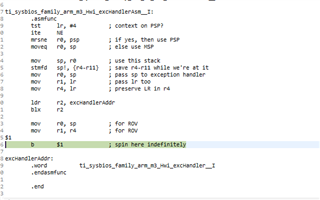Hello,
i am facing a problem with the uart 2 driver. If i am setting baudrate to 921600 and pulling rx line permanent low on LAUNCH-cc3220-modasf a exception handler is thrown. See picture:

It only happens if am using baudrate = 921600 at 115200 it won't happen.
My used SOP-Configuratuion is 000. I used the ground from j21.
Why is that happen, is it a bug in the sdk driver ?

My SDK Configuration is shown above.
BR,
Arnaud

